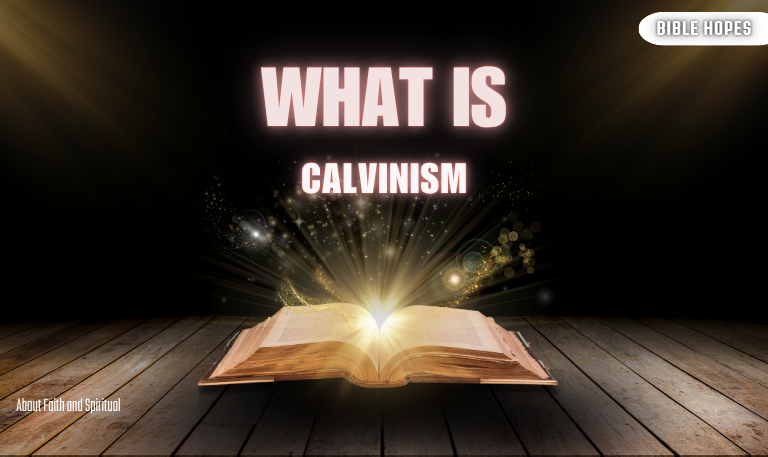Calvinism is one of the most influential theological systems within Christianity, yet many people wonder, What is Calvinism? At its core, Calvinism is a framework for understanding God’s sovereignty, human nature, and salvation. Rooted in the teachings of the 16th-century reformer John Calvin, Calvinism has shaped Protestant thought and practice for centuries.
In this article, we’ll explore the origins, core doctrines, practical implications, and contemporary relevance of Calvinism. Whether you are a student of theology, a curious believer, or someone seeking clarity on Christian doctrines, this guide will provide a detailed and authoritative overview of Calvinism.
1. What Is Calvinism?
Calvinism is a branch of Protestant Christian theology based on the teachings of John Calvin, a French theologian and pastor during the Protestant Reformation. The system emphasizes the sovereignty of God, the doctrine of predestination, and the belief that salvation is entirely dependent on God’s grace.
Calvinism is sometimes summarized by the acronym TULIP, representing five core doctrines that distinguish it from other Christian theological traditions:
Total Depravity
Unconditional Election
Limited Atonement
Irresistible Grace
Perseverance of the Saints
These doctrines highlight Calvinism’s emphasis on God’s complete control and the human inability to earn salvation through works.
2. The Historical Origins of Calvinism
Calvinism emerged during the Protestant Reformation in the 16th century, a movement that challenged the doctrines and practices of the Roman Catholic Church. While Martin Luther’s reform in Germany sparked the initial wave, John Calvin’s writings and leadership made a lasting impact, particularly in Switzerland, France, the Netherlands, and Scotland.
Calvin’s most famous work, Institutes of the Christian Religion (1536), systematically presented Protestant theology and became foundational for Reformed churches worldwide.
Read Also: Talmud vs Torah
3. The Life and Influence of John Calvin
John Calvin (1509–1564) was born in France and became one of the most prominent figures of the Reformation. After converting to Protestantism, Calvin fled to Geneva, where he established a theocratic government based on his theological principles.
Calvin’s influence extended beyond Geneva through his writings, teaching, and correspondence with reformers throughout Europe. His emphasis on biblical authority, church discipline, and predestination helped define Reformed theology, a tradition often synonymous with Calvinism.
4. The Five Points of Calvinism (TULIP) Explained
The core of Calvinism can be encapsulated in five doctrines known as TULIP:
Total Depravity
Human nature is completely fallen due to original sin, making people incapable of coming to God on their own.
Unconditional Election
God chooses certain individuals for salvation based solely on His will, not on any foreseen merit or action.
Limited Atonement
Jesus Christ’s atonement on the cross is sufficient and effective only for the elect, not for everyone indiscriminately.
Irresistible Grace
God’s grace to save a person cannot be resisted when it is extended; those whom God calls will inevitably come to faith.
Perseverance of the Saints
Those truly elected by God will persevere in faith and cannot lose their salvation.
5. The Sovereignty of God in Calvinist Theology
At the heart of Calvinism is the belief in God’s absolute sovereignty—God controls all aspects of creation and salvation. This doctrine stresses that nothing happens outside God’s will, including the salvation or condemnation of individuals.
This divine sovereignty is seen as a source of comfort to believers, assuring them that their salvation depends on God’s unchanging purpose.
6. Calvinism vs Other Theological Systems: Arminianism and More
Calvinism often gets contrasted with Arminianism, a theological system founded by Jacobus Arminius that emphasizes human free will in accepting salvation.
| Doctrine | Calvinism | Arminianism |
|---|---|---|
| Human Will | Bound by sin; incapable of choosing God | Free to accept or reject God’s grace |
| Election | Unconditional by God’s choice | Conditional on faith foreseen by God |
| Atonement | Limited to the elect | Unlimited, for all people |
| Grace | Irresistible | Resistible |
| Perseverance | Believers will persevere | Believers can fall away |
Calvinism also differs from Lutheranism and Catholicism on several doctrinal points, particularly regarding predestination and grace.
7. Predestination: What Does Calvinism Teach?
Predestination is one of the most debated Calvinist doctrines. It teaches that God has eternally chosen who will be saved (the elect) and who will not. This choice is not based on human actions but on God’s sovereign will.
This doctrine aims to underscore God’s control and the security of salvation for believers but is often misunderstood as fatalism or determinism.
8. Grace, Free Will, and Human Nature in Calvinism
Calvinism teaches that due to total depravity, humans cannot choose God without divine intervention. Grace is therefore necessary and irresistible for salvation.
While Calvinism affirms human responsibility, it holds that God’s grace effectively changes the heart, enabling a willing response.
9. How Calvinism Shapes Worship and Church Life
Calvinist theology influences many aspects of worship and church governance:
Emphasis on biblical preaching and teaching.
Simple, unadorned worship focusing on scripture and prayer.
Church discipline and accountability.
The covenant community model emphasizing mutual responsibility.
10. Calvinism’s Impact on Christian Ethics and Living
Calvinism encourages believers to live holy, disciplined lives, motivated by gratitude for God’s grace. Ethical living is seen as a natural outflow of salvation, not a means to earn it.
Calvinism also emphasizes the calling of all believers to serve God through their work and daily lives.
11. Calvinism in the Modern Church: Denominations and Influence
Many Protestant denominations today are influenced by Calvinist theology, including:
Presbyterian Churches
Reformed Churches
Some Baptist groups
Certain evangelical and non-denominational churches
There has been a resurgence of Calvinism in recent decades, particularly among younger evangelicals.
12. Common Misconceptions About Calvinism
Is Calvinism Fatalistic?
No. Calvinism affirms human responsibility within God’s sovereign plan.
Does Calvinism Deny Free Will?
Calvinism teaches a compatibilist view, where free will exists but is bound by sinful nature until God’s grace intervenes.
Does Calvinism Teach Double Predestination?
Some Calvinists affirm that God predestines both the elect and the reprobate, but this is debated.
Read Also: Christianity Vs Jehovah Witness
13. Criticisms and Theological Debates Surrounding Calvinism
Calvinism has faced criticisms such as:
Allegations of undermining human freedom.
Perceived harshness in predestination.
Disagreements over the extent of the atonement.
These debates continue among theologians and believers.
14. The Global Spread and Influence of Calvinism
Calvinism’s influence spread from Europe to North America, Africa, and Asia through missionary work and colonization. Today, millions adhere to Reformed theology worldwide.
What Is Calvinism FAQs
Q1: What Does Calvinism Teach About Salvation?
Calvinism teaches that salvation is entirely by God’s grace, and those God elects will be saved through faith in Christ.
Q2: Is Calvinism Compatible with Free Will?
Yes, Calvinism holds that human free will is compatible with divine sovereignty, but human will is only free when transformed by God’s grace.
Q3: What Is Predestination in Calvinism?
Predestination is God’s eternal choice of who will be saved, based solely on His will, not human merit.
Q4: How Does Calvinism View God’s Grace?
Calvinism teaches that God’s grace is irresistible and effectually brings the elect to salvation.
Q5: Are All Protestants Calvinists?
No, not all Protestants are Calvinists. Many follow Arminian or other theological traditions.
Q6: What Churches Are Calvinist?
Presbyterian, Reformed, and some Baptist churches are traditionally Calvinist.
Q7: Can Someone Lose Their Salvation According to Calvinism?
Calvinism teaches Perseverance of the Saints, meaning true believers will persevere and not lose their salvation.
Conclusion
Calvinism remains a significant and dynamic theological system within Christianity. Its strong emphasis on God’s sovereignty, grace, and scripture continues to influence countless believers and churches worldwide. For those interested in deepening their understanding of Christian doctrine, Calvinism offers a profound and coherent framework grounded in biblical teaching.



![15 Pink Bible Verses | Discover Meaning, Love [2025 Guide] 5 15-Pink-Bible-Verses-Discover-Meaning,-Love-[2025-Guide]](https://biblehopes.com/wp-content/uploads/2025/05/15-Pink-Bible-Verses-Discover-Meaning-Love-2025-Guide.png)